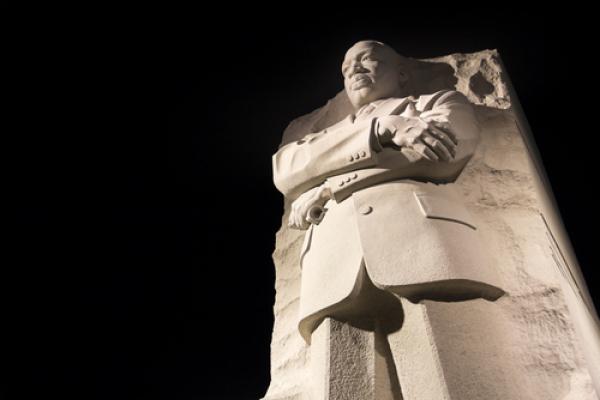Are we waiting for another Dr. King? As I collect my thoughts to write these words, I’m mindful that I don’t honestly know what discrimination is. I have never (consciously) experienced discrimination because of my race, the color of my skin, or where I come from. I have never had to say, like Solomon Northup, “I don’t want to hear any more noise.” In the film, 12 Years a Slave, Solomon refers to the cry of those being beaten and separated from their children. I speak here with a profound sense of respect and fear. Who am I, or maybe even you who read, to speak about a tragedy and a pain that we have never experienced? I only speak out of a sense of duty and a calling from God.
Dr. King wrote, “So many of our forebears used to sing about freedom. And they dreamed of the day that they would be able to get out of the bosom of slavery, the long night of injustice … but so many died without having the dream fulfilled.” (A Knock at Midnight, p.194)
To this day, millions of African Americans in our country still dream about getting out of the bosom of slavery. Slavery today is masked behind the social, financial, political, and even religious systems that deny the dignity and full integration into these systems to people of color. Solomon Northup cries out in the film saying, “I don’t want to survive, I want to live.” The struggle of African Americans is a struggle to live. So far, they have only survived.
Many of today’s “masters” confuse survival with life. Dr. King reminded us that, “God never intended for one group of people to live in superfluous inordinate wealth, while others live in abject deadening poverty.” (A Knock at Midnight, p.29) The most important right in America, the right to live in freedom and with dignity, is systematically denied to African Americans by the same institutions that are supposed to protect and fight for these rights. It must be said that because of the Civil Rights Movement, life has improved for blacks in our country, but we are far from eradicating institutional racism and a real transformation of our hearts.
What is the church doing to bring about these unfulfilled dreams? What is your congregation doing to demonstrate their commitment to live like a reconciled community, a community where all members are equal? Is racial justice and reconciliation a priority for you, your congregation and the leaders of your congregation?
The struggle for dignity and equality for African Americans in this country must be carried out in all fronts, beginning in local communities, in churches and civil organizations. But it is also necessary that we raise our voices and unite our efforts at national levels. The church, which historically has been as complicit as any other civil institution, must demonstrate its repentance and moral commitment by its actions. No Christian leader should go to bed at night in peace, without feeling the pain of millions of African-American brothers and sisters who are struggling to get out of the claws of racism.
In one of the most wrenching scenes in the film, 12 Years a Slave, a mother is sold and separated from her two children. The slave owner says to her, “Get something to eat and some rest, your children will soon be forgotten.” I fear that that is exactly what our nation is telling African Americans today.
The dream and the rights of African Americans in our country, the work of “redeeming the soul of America,” has been knocking at the door of the church for too long. The work of freeing people of all colors, rich and poor, so that they may live to their fullest potential is calling the church to account.
The church and Christian leaders, followers of the One who came, so “that they may have life, and may have it abundantly” (John 10:10), have the moral and spiritual obligation to call themselves and our nation to repentance. I often wonder what the church is waiting for to call our nation to a day of repentance and to lead us to freedom. It is time for the church to gather in a national summit on racism to address these issues and seek a spiritual repentance and conversion.
This is the work of the church; are we waiting for someone else to do it?
Carlos L. Malavé is a follower of Jesus and executive director of Christian Churches Together in the USA.
Image: Martin Luther King, Jr. Memorial, mdgn / Shutterstock.com
Got something to say about what you're reading? We value your feedback!
